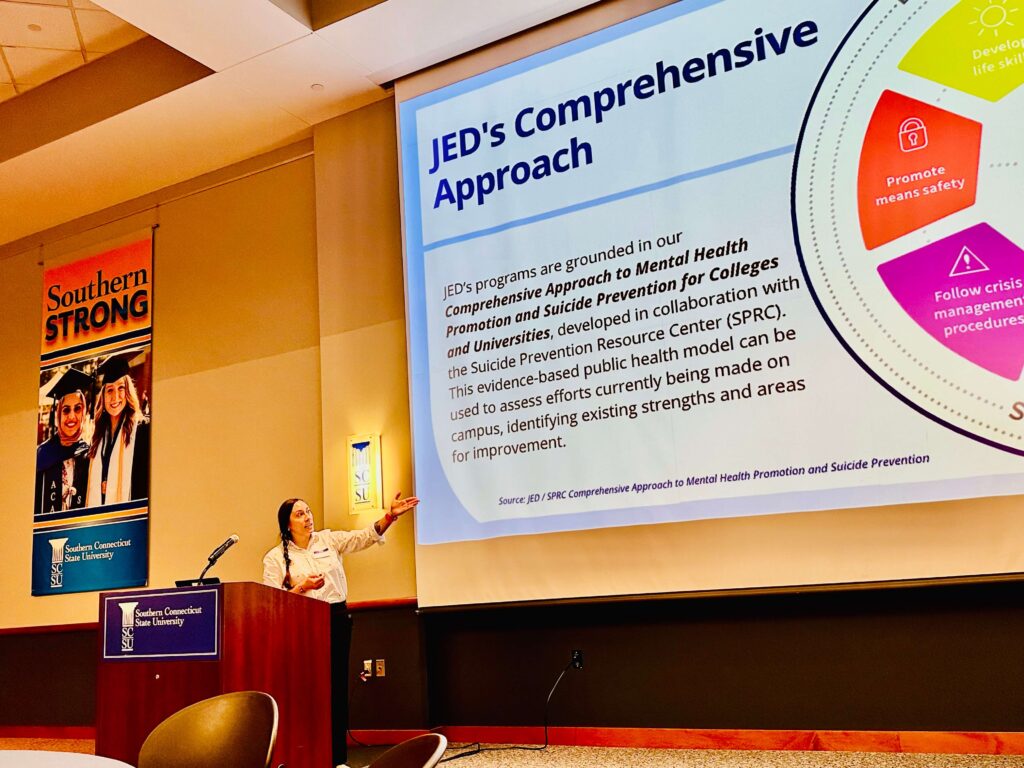Cyberbullying Resources for Parents and Caregivers
As caring and supportive adults, we aspire to guide youth toward becoming compassionate, understanding, and resilient individuals. In a world where social and emotional challenges ...

By Lauren Patetta
Representatives from the Connecticut State Colleges and Universities (CSCU) met last month for the inaugural CSCU Building Communities of Care gathering, bringing together faculty and staff from each campus and institution to discuss strategies for the initiative. The all-day event was an opportunity for CT Mental Health Coalitions to come together to share wins and challenges and brainstorm new ways for schools to create welcoming, supportive environments for all students on campus.
“There is no way to overstate the role that The Jed Foundation has played in Connecticut,” said Lesley Mara, Associate Vice President at CSCU, in her opening remarks. “The staff and leadership at The Jed Foundation saw the promise in Connecticut and put us forward for funding, which enabled us to proceed as a system at scale. We owe them a debt of gratitude.”
Staff members from all four public universities and the 12 campuses that comprise CT State Community College came together with JED Senior Director of Higher Ed Programs Diana Cusumano and Campus Advisors Michael King, Liz Bracken, and Jeni Willenzik. In breakout sessions, Campus Advisors focused on two critical areas: data storytelling and faculty-counselor partnerships.
Since joining JED Campus, each school has collected student mental health data. The JED panel gave them concrete steps to turn that data into a story that can be shared with the larger campus community, caregivers, and even funders to demonstrate the impact of their work.
To help staff and schools bolster relationships between faculty and counselors and leverage those partnerships to support student mental health, JED staff shared strategies for strengthening faculty-counselor relationships. The panel encouraged faculty and on-staff mental health experts to work together to support student mental health, including discussing ways that faculty can identify and support students who may be struggling and play a role in coordinated responses to distressing events on campus.
A critical message of the event was that a community of care supports not just students, but also faculty, staff, and administrators.
“Although [building a community of care] starts with and focuses on the students we serve, we know it also has to be a community of care for us all,” Mara said. “We hope that, in some small way, today represents a first step.”
At the end of the event, faculty and staff shared that they felt a renewed excitement for the work and a sense of unity with other cohort members.
JED would like to express deep gratitude to Southern Connecticut State University for hosting the event, as well as all school leaders, faculty, and staff who attended for their work building a community not just for students, but also for all education professionals.
If you or someone you know needs to talk to someone right now, text, call, or chat 988 for a free confidential conversation with a trained counselor 24/7.
You can also contact the Crisis Text Line by texting HOME to 741-741.
If this is a medical emergency or if there is immediate danger of harm, call 911 and explain that you need support for a mental health crisis.